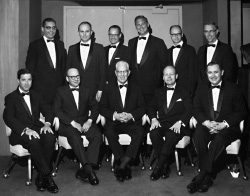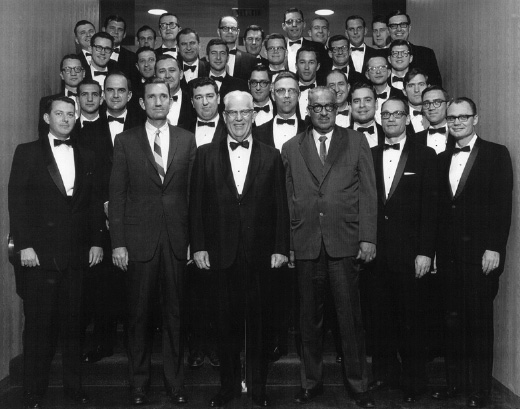 In 2004, fifty years after the U.S. Supreme Court's landmark decision in Brown v. Board of Education, UC Berkeley's Regional Oral History Office launched a project to document the experiences of law clerks of Earl Warren, Chief Justice of the Supreme Court of the United States. The project recorded video oral history interviews with all those surviving who clerked for the Chief Justice from the time he was appointed by President Eisenhower in 1953 until his retirement from the bench in 1969. These oral history transcripts are now available online. Two clerks were interviewed by ROHO in the 1970s as part of a multi-interview volume of edited transcripts, Earl Warren: The Chief Justiceship. That volume formed a small part of Earl Warren in California, a substantial oral history project centered on the Warren gubernatorial era in California, for which the Chief Justice himself was interviewed the year before his death.
In 2004, fifty years after the U.S. Supreme Court's landmark decision in Brown v. Board of Education, UC Berkeley's Regional Oral History Office launched a project to document the experiences of law clerks of Earl Warren, Chief Justice of the Supreme Court of the United States. The project recorded video oral history interviews with all those surviving who clerked for the Chief Justice from the time he was appointed by President Eisenhower in 1953 until his retirement from the bench in 1969. These oral history transcripts are now available online. Two clerks were interviewed by ROHO in the 1970s as part of a multi-interview volume of edited transcripts, Earl Warren: The Chief Justiceship. That volume formed a small part of Earl Warren in California, a substantial oral history project centered on the Warren gubernatorial era in California, for which the Chief Justice himself was interviewed the year before his death.
This project records oral history interviews with all those who clerked for the Chief Justice from the time he was appointed by President Eisenhower in 1953 until his retirement from the bench in 1969. The Brown decision banning segregation in public schools came in 1954, during his first term. The Warren Court is renowned for its guiding theme of equality before the law and expansion of the judiciary's protection of individual rights.

Out of fifty-one individuals who clerked for the Chief Justice, two were interviewed by the Regional Oral History Office in the 1970s as part of a multi-interview volume of edited transcripts, Earl Warren: The Chief Justiceship. That volume formed a small part of a substantial oral history project centered on the Warren gubernatorial era in California, for which the Chief Justice himself was interviewed the year before his death. The series of interviews adds significantly to the historical record on Warren's legacy.
Each former clerk's interview, conducted in a single-session of about two hours and recorded with digital video, has a strong focus on the yearlong (or, rarely, two-year) term of the Supreme Court clerkship. Discussions also touch on the legacy of the Warren Court, a subject the former clerks are in a unique position to comment upon at some length. The topics explored in interviews include:
- The transformative nature of the Warren period in constitutional law;
- Leadership vs. scholarship and the nature of Warren's authority;
- The role of the associate justices and of the court as a whole;
- Watershed cases, such as Brown v. Board of Education and Miranda v. Arizona;
- The role and visibility of law clerks;
- The legacy and the evolution of constitutional law since the Warren Court;
- How the experience influenced each former clerk's life and career trajectory.
Project advisors
Professors Jesse Choper, I. Michael Heyman, and Harry Scheiber of Berkeley's Boalt Hall School of Law.
Project staff
Laura McCreery, Interviewer
Linda Norton, Production Editor
David Dunham, Media and Transcription Coordinator